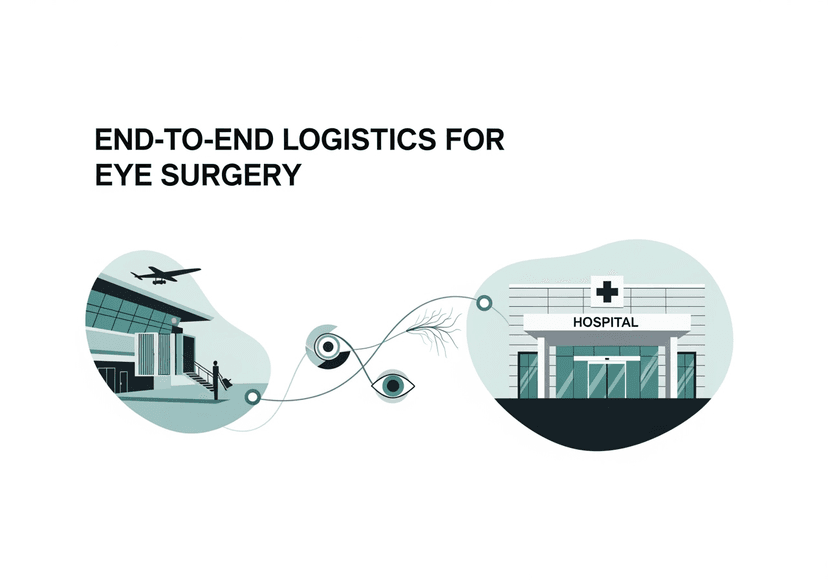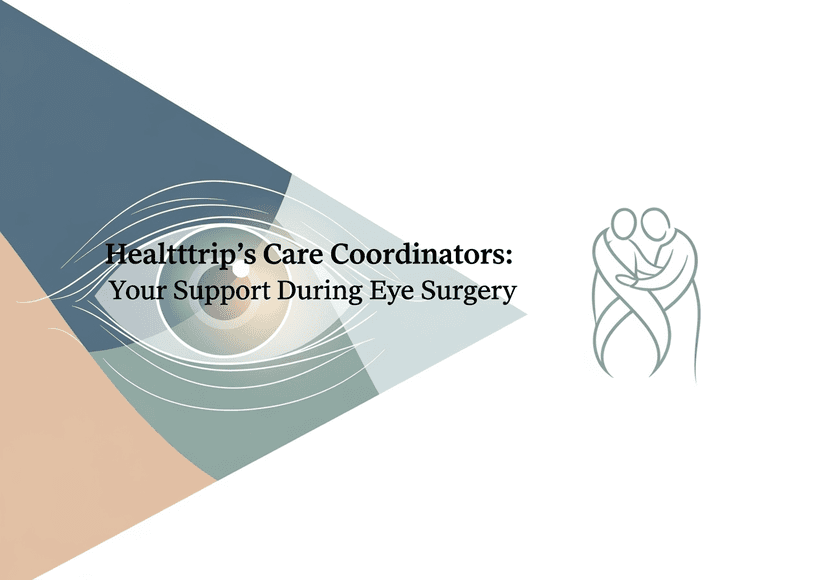
Role of Multidisciplinary Teams in Eye Surgery
16 Oct, 2025
 Healthtrip
Healthtrip- Why Multidisciplinary Teams are Essential in Eye Surgery
- Who Composes the Multidisciplinary Team in Eye Surgery? < li>Where are Multidisciplinary Teams Most Effective in Eye Surgery?
- How Multidisciplinary Collaboration Enhances Eye Surgery Outcomes
- Examples of Multidisciplinary Team Successes in Eye Surgery at Vejthani Hospital
- Challenges and Solutions in Implementing Multidisciplinary Teams at Yanhee International Hospital
- Conclusion
The Composition of a Multidisciplinary Eye Surgery Team
A multidisciplinary eye surgery team is a symphony of specialists, each playing a vital role in orchestrating the best possible outcome for the patient. At the heart of the team is the ophthalmologist, often a specialist in a specific area like retina, cornea, or glaucoma. Their expertise guides the surgical intervention, but they are supported by a network of other professionals. Optometrists are crucial for pre-operative assessments, providing detailed measurements and evaluations of the patient's vision. Nurses offer invaluable support during and after surgery, ensuring patient comfort and monitoring vital signs. Technicians assist with specialized equipment and diagnostic testing, providing crucial data for the surgical team. And let's not forget the often-overlooked but incredibly important role of counselors, who provide emotional support and guidance to patients and their families, helping them navigate the anxieties and uncertainties that can accompany surgery. Hospitals like Fortis Hospital, Noida understand that a holistic approach is key to success, offering comprehensive teams to address all patient needs.
Most popular procedures in India
Benefits of a Multidisciplinary Approach
The advantages of a multidisciplinary approach to eye surgery are manifold, like having a pit crew fine-tuning a race car for optimal performance. Firstly, it leads to more accurate diagnoses. With multiple experts reviewing the patient's case, subtle nuances that might be missed by a single practitioner are more likely to be identified. Secondly, it facilitates more comprehensive treatment plans. The team can consider a wider range of treatment options and tailor the approach to the individual patient's needs, rather than relying on a one-size-fits-all solution. This also means more streamlined and efficient care, with each member of the team contributing their expertise at the appropriate stage of the process, avoiding unnecessary delays and redundancies. Ultimately, this collaborative approach leads to improved patient outcomes, reduced complications, and a higher level of patient satisfaction. Healthtrip collaborates with hospitals such as Quironsalud Hospital Murcia that prioritize teamwork, ensuring you benefit from this comprehensive care model.
Wellness Treatments
Give yourself the time to relax
Lowest Prices Guaranteed!

Lowest Prices Guaranteed!
Specific Roles and Responsibilities
Ophthalmologists: The Surgical Leaders
Ophthalmologists, as the surgical leaders, bear the responsibility of performing the eye surgery. However, their role extends far beyond the operating room. They are actively involved in treatment planning and diagnosis, working closely with other team members to determine the most appropriate surgical technique and manage any potential complications. Furthermore, different ophthalmologists may specialize in different areas of the eye to ensure comprehensive care. For instance, one ophthalmologist might focus on cataract surgery, while another specializes in corneal transplants. Healthtrip's partner hospitals, such as Saudi German Hospital Alexandria, Egypt, boast teams of highly skilled ophthalmologists with diverse expertise, ensuring you receive the most specialized care possible.
Optometrists: The Vision Experts
Optometrists play a crucial role in pre- and post-operative care, acting as the vision experts. They conduct thorough eye examinations to assess the patient's visual acuity, eye health, and overall suitability for surgery. Their detailed measurements and evaluations provide critical data for the ophthalmologist to develop the surgical plan. Following surgery, optometrists monitor the patient's recovery, manage any refractive errors, and prescribe corrective lenses if needed. They ensure the patient's vision is optimized and that they are comfortable with their visual outcome. This collaborative relationship creates a seamless transition for the patient, promoting optimal visual recovery. In this manner, Healthtrip ensures that patients have access to a dedicated team of optometrists.
Nurses and Technicians: The Support System
Nurses and technicians are the backbone of the eye surgery team, providing essential support throughout the patient's journey. Nurses offer compassionate care, administering medications, monitoring vital signs, and educating patients about their condition and treatment plan. Technicians assist with specialized equipment, performing diagnostic tests, and preparing patients for surgery. Their expertise ensures the smooth and efficient operation of the clinic or hospital, allowing the ophthalmologist to focus on the surgical procedure. They are often the first point of contact for patients, addressing their concerns and providing reassurance. Hospitals like NMC Specialty Hospital, Al Nahda, Dubai value the crucial role of nurses and technicians in delivering comprehensive patient care, and so does Healthtrip.
The Future of Multidisciplinary Eye Care
The future of eye care is undoubtedly multidisciplinary, with increasing emphasis on collaboration and personalized treatment. As technology advances and new treatments emerge, the complexity of patient care will only increase, making teamwork even more essential. We can expect to see even more specialized roles within the eye surgery team, with experts in areas like genetic testing, artificial intelligence, and virtual reality playing a greater part in diagnosis and treatment. Furthermore, telehealth and remote monitoring will enable teams to extend their reach and provide care to patients in remote areas, improving access to specialized eye care for everyone. A strong focus on interprofessional education and training is also needed to foster a collaborative culture and ensure that all members of the team are equipped with the knowledge and skills to provide the best possible care. Healthtrip is committed to staying at the forefront of these advancements, connecting you with hospitals like Yanhee International Hospital who are embracing these innovative approaches to eye care.
Why Multidisciplinary Teams are Essential in Eye Surgery
Eye surgery, unlike some other medical fields, often requires a delicate balance of precision, advanced technology, and a deep understanding of the interconnectedness of different ocular structures. It's not just about fixing a single problem; it's about restoring vision and preserving the overall health and function of the eye, which directly impacts quality of life. That's where multidisciplinary teams come into play. Think of it like this: you wouldn't trust a single person to build a skyscraper, would you? You need architects, engineers, electricians, plumbers – each with their area of expertise – working together to create a stable, functional, and beautiful structure. The same principle applies to complex eye surgeries. A multidisciplinary team brings together different specialists who can assess the patient from various angles, identify potential risks, and develop a comprehensive treatment plan. This collaborative approach minimizes the chances of overlooking crucial details and ensures that the patient receives the best possible care. Furthermore, a team approach can be particularly beneficial in managing complex cases involving underlying systemic conditions like diabetes or hypertension, which can significantly impact surgical outcomes. By incorporating specialists who understand these conditions, the team can tailor the treatment plan to address the patient's overall health, leading to improved surgical success and long-term visual outcomes. Ultimately, the goal is comprehensive care, enhancing not just vision, but overall well-being, something Healthtrip understands connects deeply to quality of life.
The Growing Complexity of Eye Care
The field of ophthalmology has witnessed remarkable advancements in recent years, from minimally invasive surgical techniques to sophisticated diagnostic tools. While these advancements offer immense potential for improving patient outcomes, they also introduce new levels of complexity. Consider cataract surgery, for instance. While it's one of the most common surgical procedures performed worldwide, modern cataract surgery often involves the use of advanced intraocular lenses (IOLs) designed to correct presbyopia and astigmatism. Choosing the right IOL for each patient requires careful consideration of their individual visual needs and ocular anatomy. Similarly, the management of glaucoma, a leading cause of irreversible blindness, often involves a combination of medical, laser, and surgical treatments. Determining the most appropriate course of action requires a thorough understanding of the patient's specific type of glaucoma, disease severity, and response to previous treatments. In such scenarios, a multidisciplinary team can be invaluable in navigating these complexities and ensuring that the patient receives the most appropriate and effective treatment. By pooling their knowledge and expertise, the team can develop a comprehensive and individualized treatment plan that addresses the specific challenges of each case. Furthermore, a multidisciplinary approach can help to streamline the diagnostic and treatment process, reducing delays and improving efficiency. Hospitals like Fortis Shalimar Bagh recognize the importance of this team approach in managing complex eye conditions, emphasizing collaborative care for optimal patient outcomes. Healthtrip understands the need for modern healthcare and ensures patients are connected with the best facilities. The more complex the medical condition, the more important a robust coordinated care system becomes.
Who Composes the Multidisciplinary Team in Eye Surgery?
So, who are the key players on this all-star eye surgery team? It's not just the surgeon calling all the shots – it's a carefully orchestrated ensemble of specialists, each contributing their unique expertise to ensure the best possible outcome for the patient. The core of the team typically includes the ophthalmologist or eye surgeon, who is the lead physician responsible for performing the surgery. But their role extends far beyond the operating room. They are also responsible for conducting comprehensive eye exams, diagnosing eye conditions, and developing the overall treatment plan. Then there's the optometrist, playing a vital role in pre- and post-operative care. They conduct thorough vision assessments, manage refractive errors, and help patients adapt to their new vision after surgery. Optometrists are also crucial in identifying potential complications and referring patients to the ophthalmologist when necessary. Anesthesiologists are vital, especially in complex or lengthy procedures. They manage the patient's pain and ensure their safety and comfort throughout the surgery. Anesthesiologists also play a crucial role in monitoring the patient's vital signs and managing any potential complications that may arise during the procedure. Nurses, of course, are the backbone of any medical team, providing direct patient care and support throughout the entire surgical process. They assist with pre-operative preparation, intra-operative monitoring, and post-operative recovery. Nurses also play a crucial role in educating patients and their families about the surgical procedure and post-operative care instructions. Finally, don't overlook the often unsung heroes, such as ophthalmic technicians, who assist the ophthalmologist with various diagnostic tests and procedures. They are trained to perform visual field testing, optical coherence tomography (OCT), and other specialized exams that provide valuable information about the patient's eye health. And, depending on the specific case, other specialists may be brought in to provide additional expertise. For example, a cardiologist or internist may be consulted if the patient has underlying heart conditions or other medical issues that could impact the surgical outcome. Neurologists might be involved in cases of neuro-ophthalmological issues. This expansive team, all coordinated, will help improve the outcome.
The Role of Allied Health Professionals
Beyond the core medical team, allied health professionals play a crucial, yet often overlooked, role in ensuring the success of eye surgery. These individuals bring specialized skills and knowledge that complement the expertise of the physicians and nurses, contributing to a more holistic and patient-centered approach. Consider the role of a rehabilitation specialist. Following certain eye surgeries, such as those for strabismus (misaligned eyes) or low vision, patients may require rehabilitation to help them regain optimal visual function and adapt to their new visual abilities. Rehabilitation specialists can provide exercises and therapies to improve eye coordination, visual perception, and overall visual performance. Similarly, social workers and counselors can provide invaluable support to patients and their families, particularly those who are facing significant vision loss or undergoing complex and potentially life-changing eye surgeries. They can help patients cope with the emotional and psychological challenges of their condition, navigate the healthcare system, and access resources and support services. Patient care coordinators, a vital piece of the multidisciplinary puzzle, help streamline the patient's journey by coordinating appointments, managing paperwork, and ensuring clear communication between all members of the team. They act as a central point of contact for patients, answering their questions and addressing their concerns, making the entire process less stressful and more manageable. In essence, allied health professionals expand the scope of care, addressing not just the physical aspects of eye surgery but also the emotional, social, and practical needs of the patient. Facilities like Vejthani Hospital may include access to these allied professionals as part of complete packages offered through services like Healthtrip. This creates a more supportive and comprehensive experience, leading to better overall outcomes and improved patient satisfaction. It reinforces the idea that healthcare extends beyond the operating room, encompassing a wide range of services designed to enhance the patient's well-being.
Where are Multidisciplinary Teams Most Effective in Eye Surgery?
While multidisciplinary teams can benefit a wide range of eye surgery procedures, their effectiveness truly shines in situations involving complex cases, high-risk patients, and specialized treatments. Think of it as having a group of experts dedicated to solving intricate puzzles – the more complicated the puzzle, the more valuable their combined expertise becomes. One prime example is pediatric ophthalmology. Children's eyes are still developing, and their visual systems are often more sensitive and vulnerable than those of adults. Eye surgeries in children, such as those for congenital cataracts or strabismus, require a specialized understanding of pediatric anatomy and physiology. A multidisciplinary team, including a pediatric ophthalmologist, pediatric anesthesiologist, and child-life specialist, can provide the specialized care and support that these young patients need. Similarly, patients with underlying systemic conditions, such as diabetes or autoimmune diseases, often require a more comprehensive and coordinated approach to eye surgery. These conditions can increase the risk of complications and affect the healing process. A multidisciplinary team, including an endocrinologist, rheumatologist, and ophthalmologist, can work together to manage the patient's underlying health issues and optimize their surgical outcomes. Furthermore, multidisciplinary teams are essential in specialized areas of eye surgery, such as corneal transplantation and retinal surgery. These procedures often involve complex techniques and require a high level of precision. A team of corneal specialists, retina specialists, and ophthalmic technicians can collaborate to ensure the best possible outcome for the patient. Consider also cases involving trauma to the eye. These situations often require immediate and coordinated action from various specialists, including ophthalmologists, plastic surgeons, and neurosurgeons, to repair the damage and restore vision. The ability to bring together these experts quickly and efficiently can be crucial in saving sight and preventing long-term complications.
Specific Surgical Scenarios Benefiting from a Team Approach
Let's dive into some specific surgical scenarios where the benefits of a multidisciplinary team become strikingly clear. Consider the management of complex glaucoma cases. Glaucoma, often called the "silent thief of sight," can be particularly challenging to manage, especially when it involves multiple factors or doesn't respond well to initial treatments. A multidisciplinary team, comprised of a glaucoma specialist, a medical retina specialist (to rule out other retinal pathologies), and potentially even a neurologist (to assess any underlying neurological contributions), can provide a more holistic assessment and develop a tailored treatment plan. This might involve a combination of medications, laser procedures, minimally invasive glaucoma surgery (MIGS), or traditional incisional surgery. Another area where multidisciplinary teams excel is in the management of patients with uveitis, an inflammation of the middle layer of the eye. Uveitis can be caused by a variety of factors, including infections, autoimmune diseases, and even certain medications. Diagnosing and treating uveitis often requires the expertise of an ophthalmologist, a rheumatologist, and an infectious disease specialist. The team can work together to identify the underlying cause of the uveitis, manage the inflammation, and prevent long-term complications. Moreover, patients undergoing refractive surgery, such as LASIK or PRK, can also benefit from a multidisciplinary approach. While these procedures are generally safe and effective, careful screening and evaluation are essential to ensure optimal outcomes. A team of refractive surgeons, optometrists, and ophthalmic technicians can work together to assess the patient's candidacy for refractive surgery, discuss the risks and benefits of different procedures, and provide comprehensive pre- and post-operative care. The Saudi German Hospital Cairo, Egypt, for example, understands the value of such teams, and strives to integrate this model within its ophthalmic department, to achieve the best outcomes. Healthtrip aims to connect individuals with these kinds of advanced, coordinated care options, facilitating access to comprehensive treatments that address the multifaceted aspects of eye health.
Also Read:
How Multidisciplinary Collaboration Enhances Eye Surgery Outcomes
Imagine entrusting your vision to a team where every member, from the surgeon to the rehabilitation specialist, is intimately familiar with your case and actively contributes to your care plan. That's the power of multidisciplinary collaboration in eye surgery. This approach transcends the traditional model where a single surgeon bears the weight of the entire process, fostering a synergistic environment where diverse perspectives converge to optimize patient outcomes. Think of it as an orchestra, where each instrument (specialist) plays a vital role, guided by a conductor (the lead surgeon or care coordinator) to create a harmonious and effective treatment plan. For example, at Saudi German Hospital Cairo, Egypt, a patient undergoing cataract surgery might benefit from the input of an optometrist who assesses their visual needs, a cardiologist who ensures their cardiovascular health is stable for surgery, and a specialized nurse who provides pre- and post-operative care instructions. This holistic approach minimizes risks, enhances the precision of the surgical procedure, and accelerates the recovery process. The coordinated effort ensures that all aspects of the patient's well-being are addressed, leading to a more successful and satisfying outcome, showcasing Healthtrip's commitment to connecting patients with comprehensive care.
The benefits of this collaborative approach are numerous and far-reaching. Firstly, it significantly reduces the risk of complications. When multiple experts examine a patient's case, they are more likely to identify potential issues that a single physician might overlook. This proactive approach allows for the implementation of preventative measures, mitigating risks before they escalate into serious problems. Secondly, multidisciplinary collaboration leads to more accurate diagnoses. Each specialist brings a unique set of skills and experiences to the table, enabling a more comprehensive assessment of the patient's condition. This collaborative diagnostic process ensures that the patient receives the most appropriate and effective treatment plan tailored specifically to their individual needs. Consider Quironsalud Hospital Murcia in Spain; their ophthalmology department likely leverages multidisciplinary expertise to diagnose complex cases like uveitis, where the involvement of rheumatologists and infectious disease specialists can be crucial. The collaborative environment also facilitates better communication among healthcare providers. Regular meetings and consultations ensure that all team members are on the same page, fostering a shared understanding of the patient's progress and any necessary adjustments to the treatment plan. This transparent communication minimizes misunderstandings and ensures a seamless continuity of care.
Furthermore, multidisciplinary teams contribute to improved patient satisfaction. Patients feel more confident and reassured when they know that their care is being managed by a team of experts working together. The collaborative approach also empowers patients to actively participate in their own care. They are encouraged to ask questions, express their concerns, and provide input into the treatment plan. This shared decision-making process fosters a sense of ownership and control, leading to greater patient satisfaction and adherence to treatment recommendations. Healthtrip aims to connect patients with hospitals like Breyer, Kaymak & Klabe Augenchirurgie in Düsseldorf, Germany, where a patient-centric approach is paramount, and multidisciplinary teams ensure that patients are thoroughly informed and supported throughout their treatment journey. In essence, multidisciplinary collaboration in eye surgery represents a paradigm shift from a solo practice model to a team-based approach that prioritizes patient well-being and optimizes surgical outcomes. It's about bringing together the best minds and resources to deliver the highest quality of care, ensuring that each patient receives the individualized attention and expertise they deserve.
Also Read:
Examples of Multidisciplinary Team Successes in Eye Surgery at Vejthani Hospital
Vejthani Hospital in Bangkok, Thailand, stands as a beacon of excellence, particularly in its application of multidisciplinary teams to enhance eye surgery outcomes. Their success stories are a testament to the power of collaboration and specialized expertise working in harmony. One notable example involves a patient with complex diabetic retinopathy. Instead of relying solely on the skills of an ophthalmologist, Vejthani assembled a team consisting of an endocrinologist to manage the patient's diabetes, a retinal specialist to address the retinopathy, and a nephrologist to monitor kidney function (a common complication of diabetes). This holistic approach, orchestrated by a dedicated care coordinator, ensured that all aspects of the patient's health were optimized before, during, and after the surgical intervention. The result was a remarkably successful surgery with reduced complications, faster recovery, and improved overall vision for the patient. Healthtrip recognizes Vejthani Hospital as a leading institution that exemplifies the benefits of integrated care, which can be facilitated through our platform.
Another compelling case involved a child with congenital cataracts. Recognizing the unique challenges of pediatric eye surgery, Vejthani's multidisciplinary team included a pediatric ophthalmologist, an anesthesiologist experienced in working with children, and a child psychologist. The psychologist played a vital role in preparing the child for surgery and providing emotional support to both the child and their family. The team meticulously planned every aspect of the procedure, taking into account the child's developmental stage and emotional needs. This careful and compassionate approach resulted in a positive surgical experience and optimal visual outcomes for the young patient. This highlights the importance of specialized care for children, a service that Healthtrip aims to connect patients with through our network of trusted hospitals.
Vejthani's commitment to multidisciplinary care extends beyond surgery itself. Their rehabilitation program involves a team of optometrists, occupational therapists, and orientation and mobility specialists who work together to help patients adapt to their new visual abilities. For instance, after cataract surgery, a patient might receive training in low-vision aids or learn techniques for navigating their environment with their corrected vision. This comprehensive rehabilitation ensures that patients not only regain their sight but also learn how to maximize their visual function in everyday life. The success of Vejthani Hospital's multidisciplinary teams underscores the importance of a holistic approach to eye care. By bringing together diverse expertise and fostering a collaborative environment, they are able to achieve superior outcomes and improve the lives of their patients. Healthtrip is proud to feature hospitals like Vejthani, where integrated care is the standard, providing patients with access to the best possible treatment options for their vision needs.
Also Read:
Challenges and Solutions in Implementing Multidisciplinary Teams at Yanhee International Hospital
Implementing multidisciplinary teams in any hospital setting, including Yanhee International Hospital in Bangkok, Thailand, isn't without its hurdles. While the benefits are undeniable, various challenges can arise during the implementation process. One common obstacle is the resistance to change from healthcare professionals who are accustomed to working independently. Convincing physicians and other specialists to embrace a collaborative approach requires a shift in mindset and a willingness to share their expertise and decision-making power. To overcome this, Yanhee might invest in comprehensive training programs that emphasize the benefits of multidisciplinary collaboration and provide practical strategies for effective teamwork. Also, clearly defining roles and responsibilities within the team is essential to avoid confusion and conflict.
Another challenge lies in coordinating communication and information sharing among team members. In a busy hospital environment, it can be difficult to ensure that all specialists have access to the latest patient information and are able to communicate effectively with one another. Yanhee International Hospital could implement electronic health record systems that facilitate seamless information sharing and communication. Regular team meetings and case conferences can also provide opportunities for specialists to discuss patient cases and coordinate treatment plans. Moreover, addressing scheduling conflicts and logistical challenges is crucial for effective team functioning. Ensuring that all team members are available for consultations and joint appointments requires careful planning and coordination. Flexible scheduling options and the use of telemedicine technologies can help overcome these logistical hurdles. Hospitals like Yanhee, featured on Healthtrip, might also benefit from designating a care coordinator who is responsible for managing the team's schedule and ensuring that all necessary resources are available.
Furthermore, financial constraints can also pose a challenge to implementing multidisciplinary teams. The cost of hiring additional specialists, providing training, and implementing new technologies can be significant. Hospitals may need to explore creative funding models and partnerships to support the development and implementation of multidisciplinary programs. This could involve seeking grants, collaborating with research institutions, or partnering with insurance companies. Ultimately, overcoming these challenges requires strong leadership, a commitment to teamwork, and a willingness to invest in the resources and infrastructure necessary to support multidisciplinary collaboration. By proactively addressing these obstacles, hospitals like Yanhee International Hospital can unlock the full potential of multidisciplinary teams and deliver exceptional eye care to their patients. Healthtrip understands these challenges and aims to partner with facilities that prioritize continuous improvement and innovative solutions to enhance patient care.
Also Read:
Conclusion
In conclusion, the integration of multidisciplinary teams in eye surgery represents a significant advancement in patient care, offering a more comprehensive and coordinated approach to treatment. The benefits, ranging from reduced complications and improved diagnoses to enhanced patient satisfaction, are undeniable. Hospitals like Vejthani Hospital and Yanhee International Hospital, both featured on Healthtrip, exemplify the potential of collaborative care, albeit with their own unique successes and challenges. While implementing these teams requires overcoming obstacles such as resistance to change, communication barriers, and financial constraints, the solutions lie in strong leadership, comprehensive training, and innovative technologies.
As healthcare continues to evolve, the shift towards multidisciplinary care is not just a trend but a necessity. By embracing this collaborative model, healthcare providers can unlock new levels of efficiency, precision, and patient-centeredness, ultimately leading to better outcomes and improved quality of life. For patients seeking the best possible eye care, Healthtrip serves as a valuable resource, connecting them with hospitals and specialists who prioritize teamwork and integrated care. Choosing a facility that embraces a multidisciplinary approach ensures that you are receiving the most comprehensive and well-rounded care possible, paving the way for a brighter and healthier future for your vision.
Also Read:
Related Blogs

How Healthtrip Ensures Quality & Safety in Eye Surgery Procedures
Detailed guide on eye surgery, featuring doctors, hospitals, risks, recovery,

End-to-End Logistics for Eye Surgery with Healthtrip's Support
Detailed guide on eye surgery, featuring doctors, hospitals, risks, recovery,

Healthtrip's Care Coordinators: Your Support During Eye Surgery
Detailed guide on eye surgery, featuring doctors, hospitals, risks, recovery,

Top 5 Indian Hospitals for Eye Surgery
Detailed guide on eye surgery, featuring doctors, hospitals, risks, recovery,

Post-Eye Surgery Diet and Lifestyle Tips
Detailed guide on eye surgery, featuring doctors, hospitals, risks, recovery,

Common Risks in Eye Surgery and How Healthtrip Manages Them
Detailed guide on eye surgery, featuring doctors, hospitals, risks, recovery,










